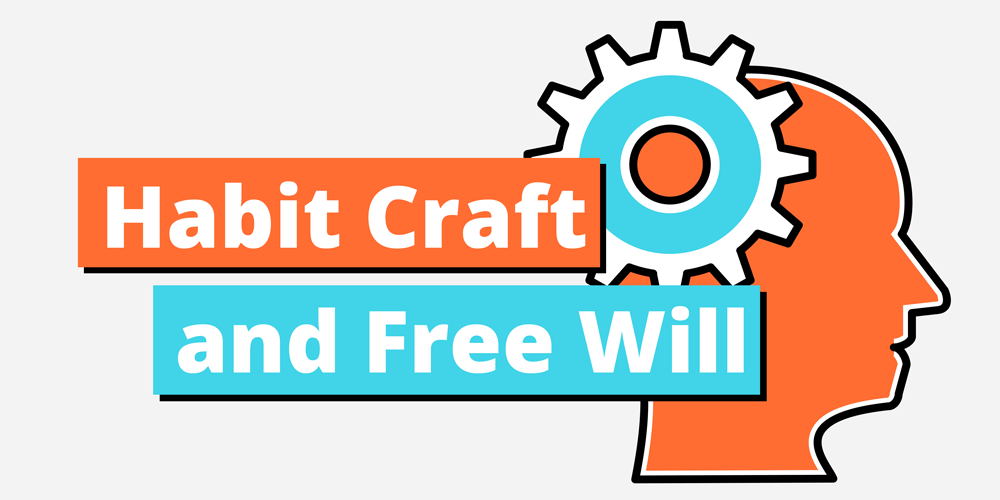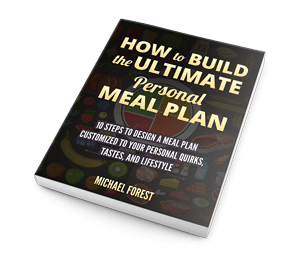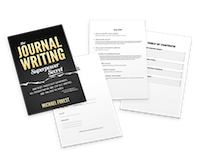Steve Scott has an update on his book, Habit Stacking.
The premise of the book is very simple:
You stack a series of small but impactful habits one on top of the other, and then do them all, one after the other, at a specific time every day, so that each habit in the chain is a kind of cue or trigger for the next habit.
I sent a message to my email list about it, and it got me thinking about free will. I have been thinking about free will a lot, recently.
Let me make a recommendation:
Create one, simple habit stack from the 127 ideas in the book.*
(* then let me know how it goes.)
Why try habit stacking
There is a very, very important benefit to working with habits in the way S.J. Scott describes.
That is, when you work with your own habits, when you work with your own routine, when you decide how and when you’ll stack habits together in a way that serves you, and when you do it in a way that you know takes you one step closer to your goals and to the person you want to be — that has power. Real power.
I call it habit craft, and what it does is build up your sense of agency, autonomy, self-efficacy and free will.
In Charles Duhigg’s new book, Smarter Better Faster, it’s called having an “internal locus of control.” It’s why in the marines they put you in charge of little things right from the get-go. Making small decisions, creating responsibility as a habit, is important.
It builds up your sense of mastery and that locus of control, and then, it teaches you how to access those things even when life makes it difficult.
Self-Efficacy: Because life is an asshole sometimes
Because left does make it difficult. Life’s just like that sometimes. It’s mean.
Sometimes it genuinely sucks. And in those dime-a-dozen motivational speeches we tend to play up “and then I overcame blah blah” but we downplay the actual experience of that when you still have to work through it. It’s not pleasant.
In movies there’s a motivational speech, and then the team pulls through, a montage of the team playing well, and then the end. Except that isn’t how it works. (There are exceptions.)
To quote an aging Rocky Balboa to his son: “life will beat you to your knees and keep you there if you let it.”
Here, more from this little speech:
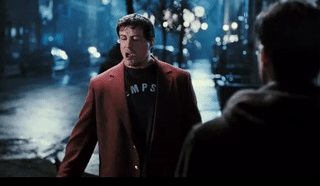
Rocky Balboa (2006)
I’ll tell you something you already know.
The world ain’t all sunshine and rainbows; it’s a very mean and nasty place. And I don’t care how tough you are, it will beat you to your knees and keep you there permanently if you let it.
You, me, or nobody is gonna hit as hard as life. But it ain’t about how hard you hit. It’s about how hard you can get hit and keep movin’ forward. How much you can take and keep movin’ forward.
That’s how winnin’ is done!
I mean, sure, you can look at that and say, “Oh, it’s Rocky. Blah blah, empty motivation.”
Or, you can look at it and realize there’s probably something to some of these clichés.
Habit Stacking, Agency and Some Brain Research
When you make a decision, when you experience your own agency as a human being with free will, there’s a specific area of your brain that lights up.
Dr. Bessel van der Kolk calls this area the mohawk of self-awareness, based on where it is in the brain, towards the midline structures in the brain.
This mohawk of self-awareness involved in decision-making, being pro-active, self-regulation, and your sense of self-awareness, your sense of an “I.” (It’s involved in a bunch of other stuff, too. I’m vastly oversimplifying a more chaotic, complex non-linear system.)
You can build up this area or weaken it.
For example, if you traumatize someone, that area becomes less active. As van der Kolk points out, if you stick a person who has been traumatized in an fMRI, ask them to think about nothing in particular, and you can see that area of the brain just doesn’t light up like it used to light up. You’ve robbed them of something fundamental related to their sense of self.
By contrast, if you teach yourself to deal with stress by doing something positive — anything — whether that’s a fast-paced walk that balances your brain’s dopamine and seratonin, or it’s just texting a friend, or literally anything that proves, “Yes, there is a thing I can do in situations like this, and I am not trapped,” you build up this area.
You develop self-efficacy and — perhaps more importantly — a sense of having that self-efficacy. It’s yours.
I can’t prove it, but I’m willing to bet that mohawk of self-awareness lights up just a wee bit more, becomes just a bit more resilient.
The worst times in my life all come from prolonged periods where I felt I had no control and I felt trapped.
Go in the other direction. Build up your agency. No, I don’t mean just watch old Rocky training clips over and over. That won’t help. Actually do things that build up those neural connections in the brain.
Build up your sense of self-efficacy, your sense of control and mastery.
You can do it by just being pro-active with basic stuff like habit craft, habit stacking, and customizing and crafting personal routines.
First, it’ll feel good, and second, it’ll create a positive habit cascade in the other areas of your life.
Think of self-efficacy, or an internal locus of control, or whatever you want to call it, like a reserve. There will be times when you need it.
Because again: life.
I suspect that if you are at all like me (read: you are human), your capacity to withstand life’s bullshit is probably not infinite.
Practice habit craft, and here’ s an easy way to start right now: begin with a habit stack.
